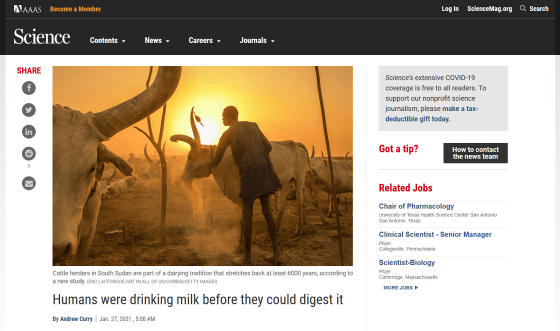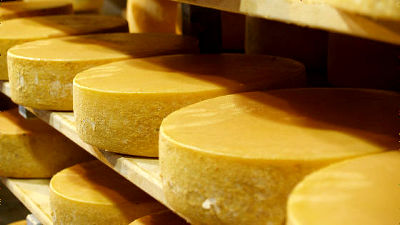Evidence found in Africa that humans were consuming milk 'before they were able to digest milk'

While some people in the world get hungry when they drink milk, others have no problem drinking milk on a daily basis. It is known that humans have acquired a constitution that can digest milk by genetic mutation, but in a paper published by an international research team, 'Evidence that humans were ingesting milk before it became able to digest milk. Was reported to have been found in human bones in Africa.
Ancient proteins provide evidence of dairy consumption in eastern Africa | Nature Communications
Humans were drinking milk before they could digest it | Science | AAAS
https://www.sciencemag.org/news/2021/01/humans-were-drinking-milk-they-could-digest-it

Drinking milk makes you hungry because the activity of
However, some humans have acquired a state of lactase activity persistence due to gene mutation, and it is said that they continue to maintain lactase activity even when they become adults. People with persistent lactase activity can digest lactose even after they grow up, so drinking milk does not make them hungry.
It is known that human lactase activity persistence is acquired, and it has developed in the past few thousand years triggered by gene mutation. When lactase activity persistence was born, it spread rapidly all over the world, and at the time of writing the article, people with lactase activity persistence are distributed mainly in Europe, the Middle East, and Africa. The rapid spread of lactase persistence indicates that the ability to break down lactose and nourish from animal milk had great advantages, and of the largest natural selection ever observed. It seems to be one.

Whether humans began to drink animal milk after acquiring lactase activity persistence, or whether they had been drinking milk since the time when lactose could not be decomposed, was a major issue regarding the history of milk. So an international research team of researchers from Germany, Sudan, Switzerland, Australia and the United States investigated when milk consumption in Africa began.
It is possible that the habit of drinking animal milk has taken root for a long time, as there have been herders in Africa who have raised cows, sheep and goats for thousands of years. The research team investigated hardened tartar in human bones found in Sudan and Kenya in East Africa 2000 to 6000 years ago and analyzed whether they were ingesting milk.
As a result of the analysis, proteins specific to animal milk were found in a total of eight tartar found in two locations in Sudan and three locations in Kenya. The oldest human skeleton found in Sudan is 6000 years ago, and the one found in Kenya is 4000 years old, which seems to be the earliest direct evidence of dairy intake in the world. ..
The study suggests that sub-Saharan herders 'have a cultural habit of consuming milk before having a genetic mutation that digests milk,' and 'dairy and milk intake are in Europe. It is said that it overturns the white-centered idea that 'it spread in Japan.'

'The African community seems to have been drinking milk before lactase activity persisted,' said Madeleine Bleasdale, a protein expert at the Max Planck Institute for Human History Sciences, who co-authored the paper. When people in the era without lactase activity consume milk, it seems that the general strategy was to process it into fermented dairy products such as cheese and yogurt to make it easier to break down lactose, and in this study, milk-derived protein was used. The people found may also have been consuming milk in the form of cheese or yogurt.
People who can break down lactose can get more nutrients from milk than those who don't, so they are believed to have tended to live longer than others. Also, if the animal's milk could be used for nutrition, it would be possible for herders to sustain the herd without killing the livestock and turning it into meat, which may have been beneficial to their survival.

Related Posts:







